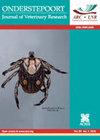بررسی ویژگیهای مولکولی و توکسیژنیک جدایههای کلستریدیوم پرفرینجنز تیپ B از گوسفند و بره
IF 1.6
3区 农林科学
Q2 VETERINARY SCIENCES
Onderstepoort Journal of Veterinary Research
Pub Date : 2021-06-22
DOI:10.22059/JVR.2020.296158.3015
引用次数: 0
Abstract
BACKGROUND: Clostridium perfringens is an important animal pathogen that causes severe loses to the livestock and poultry industries. Therefore, bacterial detection is believed to be of particular importance. OBJECTIVES: The present study aimed to identify Iranian isolates using conventional and molecular methods and to evaluate their toxicity. METHODS: In this work, 23 Clostridium perfringens type B isolates were examined via microbiological and biochemical tests. Subsequently, they were subjected to PCR technique for the final confirmation. After culturing of the isolates in specific medium, the minimum lethal dose test was performed. The most toxigenic isolate and reference strain was prepared the enterotoxaemia anaculture vaccine. Serum neutralization test was performed on the experimental inactive vaccines. RESULTS: The results revealed that etx and cpb gene could be found in all of the isolates, yet cpb2 gene was found in 65.2 % of the isolates. The minimum lethal dose ranges for these bacteria was less than 1/10 to more than 1/900. The results of serum neutralization in Iranian isolate and reference strains were 5 and 10 IU / ml, respectively. CONCLUSIONS: The findings herein implied that strain 1795 with high toxicity could be used in vaccine production. Of course, for use in production, further research on target animals is needed.背景:产气荚膜梭菌是一种重要的动物致病菌,给畜禽养殖业造成严重损失。因此,细菌检测被认为是特别重要的。目的:本研究旨在用常规方法和分子方法鉴定伊朗分离株,并评价其毒性。方法:对23株B型产气荚膜梭菌进行微生物学和生化检测。随后,对它们进行PCR技术进行最终确认。分离菌在特定培养基中培养后,进行最小致死剂量试验。制备出产毒力最强的分离株和参考菌株,制备出肠毒血症无培养疫苗。对实验灭活疫苗进行血清中和试验。结果:所有分离株均检出etx和cpb基因,65.2%分离株检出cpb2基因。这些细菌的最小致死剂量范围是小于1/10到大于1/900。伊朗分离株和参考株的血清中和结果分别为5 IU / ml和10 IU / ml。结论:该毒株具有较高的毒性,可用于疫苗生产。当然,为了用于生产,还需要对目标动物进行进一步的研究。
本文章由计算机程序翻译,如有差异,请以英文原文为准。
求助全文
约1分钟内获得全文
求助全文
来源期刊
CiteScore
4.30
自引率
0.00%
发文量
13
审稿时长
16 weeks
期刊介绍:
The Onderstepoort Journal of Veterinary Research, is the official publication of the Onderstepoort Veterinary Institute. While it considers submissions from any geographic region, its focus is on Africa and the infectious and parasitic diseases and disease vectors that affect livestock and wildlife on the continent.

 求助内容:
求助内容: 应助结果提醒方式:
应助结果提醒方式:


